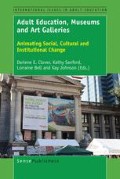Abstract
Preparing pre-service teachers to engage in the greater-than-school world, think broadly about alternative sites of learning and address contemporary issues in education and society is challenging, and requires connections between formal, non-formal and informal education. Museums are spaces that can provide this, as they can engage students with historical artefacts and narratives that provide a platform to develop critical understandings about the world around them. However, museums can also be sites of hegemonic oppression and exclusion that perpetuate the status quo by excluding or misrepresenting some stories whilst privileging others (Clover, 2015). Critical pedagogy in museums is about rendering visible these hidden or misrepresented stories (Borg & Mayo, 2010).
Access this chapter
Tax calculation will be finalised at checkout
Purchases are for personal use only
Preview
Unable to display preview. Download preview PDF.
References
Andreotti, V. (2015). Global citizenship education otherwise: Pedagogical and theoretical insights. In A. Abdi, L. Shultz, & T. Pillay (Eds.), Decolonizing global citizenship education (pp. 221–230). Rotterdam: Sense Publishers.
Aoki, T. (2005). Spinning inspirited images in the midst of planned and live(d) curricula. In W. F. Pinar & R. L. Irwin (Eds.), Curriculum in a new key (pp. 413–423). Mahwah, NJ: Lawrence Erlbaum Associates, Publishers.
Archibald, J., Lundy, J., Reynolds, C., & Williams, L. (2010). Accord on indigenous education. Retrieved from www.csse.ca/ACDE
Berry, A. (2007). Reconceptualizing teacher educator knowledge as tensions: Exploring the tension between valuing and reconstructing experience. Studying Teacher Education, 3(2), 117–134.
Canadian Literacy and Learning Network.
Clover, D. E. (2015). Adult education for social and environmental change in contemporary public art galleries and museums in Canada, Scotland and England. International Journal of Lifelong Education, 34(3), 300–315.
Corrin, L. G. (2011). Mining the museum: Artists look at museums, museums look at themselves. In D. Globus (Ed.), Fred Wilson: A critical reader (pp. 45–66). New York, NY: Ridinghouse.
Freire, P. (1978). The pedagogy of the oppressed. New York, NY: Seabury.
Grenier, R. S., & Sheckley, B. (2008). Out on the floor: Experiential learning and the implications for preparing docents. Journal of Museum Education, 31(1), 79–93.
Grumet, M. R. (2009). Curriculum inquiry, theory, and politics. Curriculum Inquiry, 39(1), 221–234.
hooks, b. (2003). Teaching community: Pedagogy of hope. London: Routledge.
Irwin, R. L. (2013). Becoming a/r/tography. Studies in Art Education, 54(3), 198.
Martínez de Morentin de Goñi, J. I. (2006). What is adult education?: UNESCO Answers. Florida, FL: San Sebastian UNESCO Centre.
Mayo, P., & Borg, C. (2010). Museums: Adult education as cultural politics. New Directions in Adult and Continuing Learning, 127, 35–44.
Monk, D. (2013). John Dewey and adult learning in museums. Adult Learning, 24(2), 61–74.
Mota, S., & Esteves, A. M. (2014). Reinventing emancipation in the 21st century: The pedagogical practices of social movements. Interface: A Journal for and about Social Movements, 6(1), 1–24.
Nightingale, E., & Sandell, R. (Eds.). (2012). Museums, equality and social justice (pp. 1–9). New York, NY: Routledge.
Phelan, A. (2011). Towards a complicated conversation: Teacher education and the curriculum turn. Pedagogy, Culture & Society, 19(2), 207–220.
Sanford, K., Williams, L., Hopper, T., & McGregor, C. (2012). Decolonizing teacher education: Indigenous principles informing teacher education. Education, 18(2), 18–34.
Schubert, W. H. (2008). Curriculum inquiry. In M. Connelly, M. Fang He, & J. Phillion (Eds.), The Sage handbook of curriculum and instruction (pp. 399–420). Thousand Oaks, CA: Sage Publications.
UNESCO. (2005). Guidelines and recommendations for reorienting teacher education to address sustainability. Retrieved from http://unesdoc.unesco.org/images/0014/001433/143370e.pdf
Williams, L. (2015). Lil’wat principles and pronunciation guide. Retrieved from https://sites.google.com/site/lulwatprinciples
Author information
Authors and Affiliations
Editor information
Editors and Affiliations
Rights and permissions
Copyright information
© 2016 Sense Publishers
About this chapter
Cite this chapter
Jayme, B.d.O., Gough, K., Sanford, K., Monk, D., Mimick, K., O’Connor, C. (2016). Museum Hacking as Adult Education. In: Clover, D.E., Sanford, K., Bell, L., Johnson, K. (eds) Adult Education, Museums and Art Galleries. International Issues in adult Education. SensePublishers, Rotterdam. https://doi.org/10.1007/978-94-6300-687-3_18
Download citation
DOI: https://doi.org/10.1007/978-94-6300-687-3_18
Publisher Name: SensePublishers, Rotterdam
Online ISBN: 978-94-6300-687-3
eBook Packages: EducationEducation (R0)

